Dry Mouth After 50: Why it Happens & 15 Natural Solutions
Ever woke up with a dry cough, or struggled to chew, or couldn’t swallow food due to pain? If you have, you likely have dry mouth.
This condition, also known as xerostomia, occurs when the salivary glands don’t produce enough saliva. This condition affects many people, especially those over 50, with most of them ignoring it. They may not even suspect it could be their medication, pinning the cause down to aging.
Some people may turn to candies or gum, unaware of the cost of composite fillings, which help treat tooth decay. At 65 Broadway Dental, we prioritize identifying the underlying causes of dry mouth and providing effective treatment for oral well-being.
This blog explores the causes of dry mouth after 50 and 15 natural ways to manage or solve it.
What is Dry Mouth?
Dry mouth is a condition wherein the salivary glands don’t produce enough saliva. This shouldn’t be confused with the version people feel when nervous, panicked, or upset.
Severe dry mouth is an indication of serious health and dental issues. A quick oral exam at the dentist can identify xerostomia and deliver a treatment.
What are the Symptoms of Dry Mouth?
Dry mouth symptoms can range, but the most commonly experienced ones in people over 50 are:
- Bad breath
- Altered sense of taste
- Dry and sore throat
- Dryness or stickiness in the mouth
- Cracked lips and split skin at the corners of the mouth
- Thick or string-like saliva
- Difficulty swallowing, chewing, or even speaking
Suffering from these issues makes eating and speaking very difficult. It can also affect your social life and ability to continue your life normally.
What Deficiency Causes Dry Mouth?
Reduced saliva production isn’t a problem caused by one deficiency. A shortage of various items can cause this condition, and this includes:
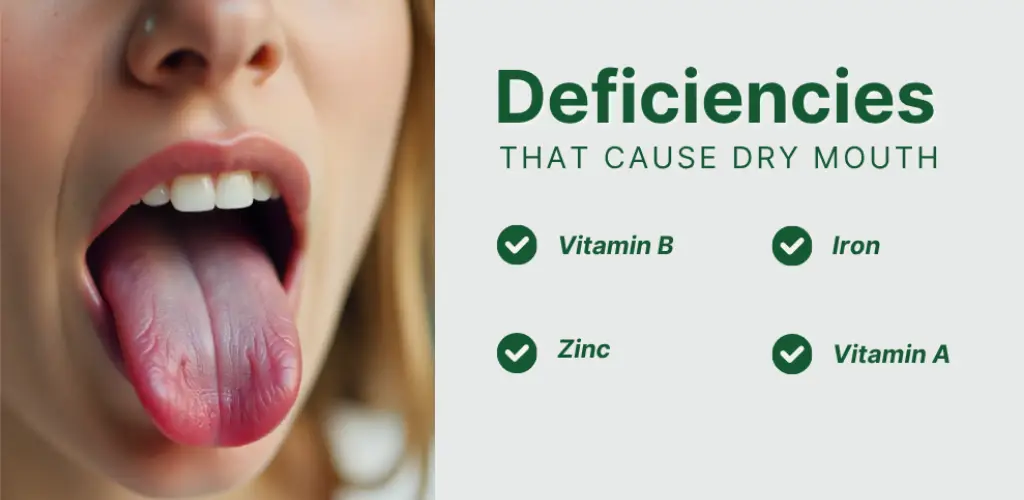
Vitamin B
Lacking B vitamins can cause a variety of tongue and mouth symptoms. The exact symptoms will depend on which group is absent.
Low B2 and B3 cause a swollen tongue. Low levels of B6 can cause the tongue to burn or be painful. Poor B12 levels can cause tingling and dry mouth.
When grouped, these foods help improve all B vitamin levels:
- Legumes
- Dairy products
- Nuts
- Meat
- Beans
- Seafood
- Fruit
- Eggs
- Fortified cereals
Iron
Iron is a vital mineral required by the human body. When it is lacking, symptoms can include a painful, red tongue and insufficient saliva production.
This mineral is found in surplus in foods like:
- Dark green vegetables
- Meats
- Seafood
- Legumes
- Whole and enriched grains
Zinc
Unlike other minerals and hormones, Zinc doesn’t affect the salivary glands in the same way. It can affect the composition and amount of saliva the glands produce.
The altered saliva provides less protection to teeth, resulting in oral infections and cavities.
You can increase your Zinc levels by eating:
- Dairy products
- Nuts
- Legumes
- Meat products
- Nuts
- Seafood
- Whole grains
- Fortified cereals (Vitamin-enhanced cereals)
Vitamin A
Missing the crucial vitamin A group can lead to dry mouth, among other oral health issues. However, excessive amounts of them can also be harmful.
When levels are too high, symptoms such as dry, sore mouth and cracked lips can appear.
To get the FDA-prescribed 900 micrograms, you should add these foods to your diet:
- Fruits (pumpkin, cantaloupe)
- Vegetables (carrots, spinach, broccoli, sweet potatoes)
- Fortified cereals
- Eggs
- Dairy products
Estrogen
When considering the reasons for dry mouth in women over 50, hormonal changes do arise. Women experiencing menopause suffer from declining Estrogen production. A symptom created from reduced hormone levels is lower saliva production.
This is why doctors would suggest using a supplement or hormone replacement therapy. Women can find estrogen supplements in tablet form to help balance their intake and levels.
What is a Dry Mouth a Sign of?
A dry mouth could signal many things. Looking at diet, routine, habits, and health can help narrow down and identify the cause. Here’s a look at some of the factors that low saliva can be hiding:
Dehydration
Not drinking enough water or not drinking it often enough can affect saliva production. Sipping water throughout the day moistens the mouth and loosens the mucus. Health providers also suggest keeping water at your bedside to drink at night.
Medications
Are you doing everything else right, and can’t find the cause of low saliva output? It could have an unexpected cause: your medicine.
There are hundreds, possibly thousands, of medications that cause dry mouth. People aged 50 and above experience lower saliva levels due to medications.
Excessive Alcohol or Caffeine Intake
Alcohol, caffeine, and tea are known to make the mouth dry. Besides this condition, they can lead to other complications that affect oral health.
Anyone with severe oral health issues should reduce or even quit these habits. Doing so will allow your mouth to heal through various periodontic procedures.
Disease
If the medication isn’t decreasing saliva levels, the conditions you’re treating could be. Some diseases, like stroke, HIV/AIDS, and Parkinson’s disease, come with it as a symptom.
Certain treatments can cause this unwanted oral condition. This includes radiation and chemotherapy to treat head and neck cancers. They cause damage to the salivary gland tissues.
Autoimmune Disease
Sjögren’s syndrome, an autoimmune disease, causes the body to attack moisture-producing glands.
Patients suffer from dry eyes and a dry mouth in addition to other symptoms. This condition can be diagnosed with blood tests or by measuring tear or saliva production.
Autoimmune Disease
Nerve damage in the head or neck can affect saliva production. Additionally, infections or injuries to this area can result in damage to the salivary glands.
Substance Abuse
Using illegal or recreational drugs like marijuana can cause dryness in the mouth. These substances can cause tooth decay and gum swelling, a warning sign of gum disease.
Smoking is another reason why your mouth could be drying out. Quitting smoking will have beneficial effects on your health and teeth.
Constant smoking can leave teeth looking stained, worn, and even yellow. You may need professional teeth whitening more frequently than normal if you smoke.
What is the Fastest Way to Cure Dry Mouth?
The fastest way to cure dry mouth conditions requires understanding the cause and severity.
“The fastest solution is hydration, yet the smartest solution for lasting comfort is identifying the cause of mouth dryness.” – Dr. Alexander Heifitz, founder of 65 Broadway Dental NYC
Drinking Water
If it is temporary or not severe, you can solve it by drinking more water. Alternatively, chewing on ice cubes or chips can have a positive effect on saliva production.
Over-the-Counter Aids
If the lack of saliva is permanent or caused by medicines, medical treatment is necessary. Cevimeline and Pilocarpine are two medications prescribed to help people suffering from Sjögren’s syndrome.
How to Increase Saliva in the Mouth Naturally
Natural ways to increase saliva production include homemade remedies. Here, anyone can look to the following solutions to increase saliva levels.
1. Stay Hydrated
Staying hydrated throughout the day will keep your mouth moist. This isn’t a bad practice, as it also stops food from decaying between teeth.
2. Add Fibrous Foods to Your Diet
Adding crunchy fruit items to your diet can help your oral health. Apples, carrots, celery, and cucumbers require chewing and biting. These activities can activate the salivary glands and trigger more saliva production.
3. Get Vitamin Supplements
If you cannot maintain a diet rich in vitamins, getting a multivitamin supplement is necessary. A lack of Vitamin A, B12, Iron, and Zinc can worsen your dry mouth.
Vitamin supplements are easily available in tablet form. They are available over-the-counter to anyone with a deficiency to adjust their levels.
4. Use a Humidifier at Night
Using a humidifier at night can improve the night time atmosphere. Extra moisture in the air can help to relieve throat discomfort and improve moisture levels in the mouth.
These devices will work to release moisture into a dry room at regular intervals.
5. Chew Sugarfree Gums or Lozenges
Chewing gum is another substance that can stimulate the muscles and glands in the jaw. There are also special lozenges that can help bring about better saliva production.
However, it’s vital to find a sugar-free alternative! The reason is that excessive sugar intake can damage teeth, and adults aren’t immune. Tooth decay worsens after 60 due to several reasons.
6. Find Herbal Replacements
Most processed products can contain harsh, refined ingredients. Some of them can affect your salivary glands and can cause them to stop producing saliva.
Finding a herbal or natural replacement is always advisable in such cases. These substances are less complex and contain simplified raw materials.
7. Adjust Your Diet
Your diet can also help restore saliva production if adjusted appropriately. Reducing sugary foods and replacing them with healthier alternatives makes a difference.
Looking after your teeth is looking after your health because dental health affects overall health.
Spicy food can make mouth dryness worse. It can also irritate the tongue and sensitive, chapped lips.
8. Breathe Through Your Nose
Many people have the habit of mouth breathing or snoring. These practices can influence saliva levels in the mouth.
Mouth breathing tends to dry out the mouth, and breathing from the nose improves the situation. If snoring is the cause, consulting a doctor for snoring can help.
Alternatively, your dentist can treat you for snoring using surgery-free NightLase Laser Snoring Treatment.
9. Improve Oral Hygiene
Sometimes, a dry mouth is a side effect of not maintaining the right oral care. Changing your oral care practices can improve low saliva output.
Using the wrong toothbrush and toothpaste can be two causes leading to the problem. Switching to a soft-bristle toothbrush and dentist-approved toothpaste can make all the difference.
10. Limit Alcohol, Coffee, & Tea
Beverages like alcohol, tea, and coffee are known to cause problems for the teeth. Besides needing cosmetic dentistry to hide stains, they can dry up the mouth.
Reducing intake or choosing herbal alternatives is the best solution. Doing this provides overall benefits to your well-being and dental health.
11. Over-the-Counter Solutions
Medications are available to treat low saliva production as a standalone condition. These medications have certain ingredients that help stimulate saliva production without damaging the teeth. Some of the ingredients it contains are:
- Xylitol
- Humectants
- Viscosity agents (Carboxymethylcellulose or Hydroxyethyl Cellulose)
- Enzymes (Lysozyme / Lactoperoxidase)
12. Try Saliva Substitutes
People with saliva issues can try the artificially made alternatives. These are available in the form of sprays, gels, and edible jellies.
These over-the-counter substitutes usually provide immediate but temporary results. Their active components are cellulose-based, allowing them to mimic saliva with high accuracy.
13. Moisten Foods
Softening foods using margarine, broths, gravy, or creams can help a dry mouth. Sticking to soft, lukewarm meals can be easy on the mouth.
You’ll want to avoid harder, saltier foods that can contribute to mouth drying.
14. Use Homemade Mouthwash
Making homemade mouthwash isn’t as hard as it sounds. Traditional store-bought mouthwashes can be harsh, containing damaging chemicals.
It contains three ingredients: water, salt, and baking soda. To be exact, ½ a teaspoon of baking soda, ½ a teaspoon of salt, and 8 ounces of water.
15. Moisturize Your Lips
Although this won’t directly stimulate saliva production, it eases the side effects. Chapped and sensitive lips, along with dry and cut mouth corners, are symptoms of mouth dryness.
Using a simple lip moisturizer can help reduce some of the effects of mouth dryness. It can help retain some of the moisture in the mouth. Frequent moisturization can also eliminate the need for concentrated medications.
Miracle Cure for Dry Mouth at Night?
While there isn’t a “miracle cure for dry mouth at night,” a combination of efforts will help.
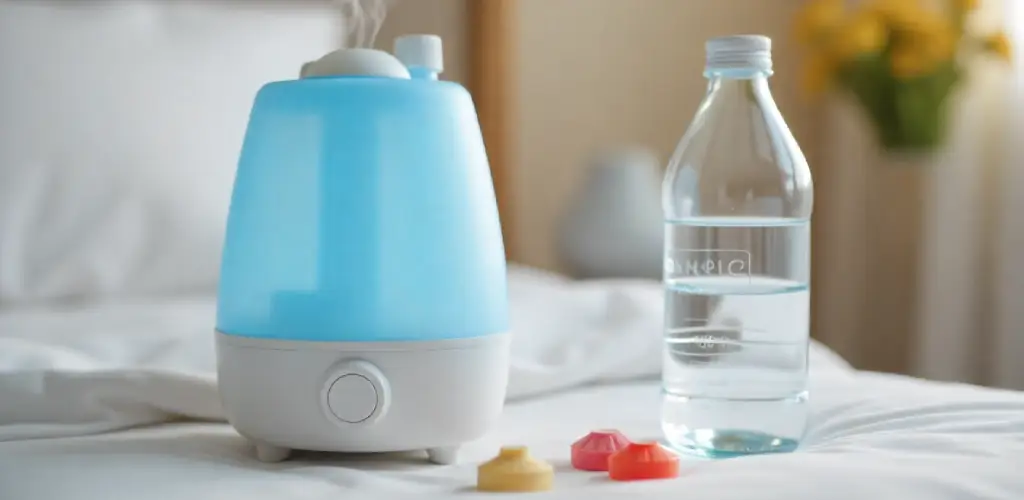
Using a nighttime humidifier and saliva-boosting medications can work for many people. Additionally, your dentist would advise sipping water and staying hydrated before bedtime.
There are other approaches to keep your mouth moist at night, but these are the best.
What Can I Do to Manage Dry Mouth?
Managing this salivary gland condition will be necessary to maintain your quality of life.
Drink More Water
Drinking more water is a safe way to try to reverse low saliva production. It’s worthwhile trying this option before trying any medications. Sipping water throughout the day can help stimulate the mouth and maintain saliva production.
Reduce Coffee or Tea Intake
Drinking excessive amounts of coffee or tea can be a bad habit with damaging effects. Reducing it to a minimal cup or even finding an alternative is ideal.
Try Herbal Remedies
Herbal remedies are advisable for people who are sensitive to harsh chemicals. These substitutes can have natural substances that help promote saliva production.
Improve Oral Hygiene
Poor oral health can be an unsuspecting cause of dry mouth. Frequent dentist visits and dental cleaning can help catch this condition and others before they develop.
Consult Your Dentist
Regular dentist visits keep your dental health provider aware of your dental status. Visiting your doctor or dentist can help them identify and treat mouth dryness. That is, before it becomes severe enough to affect your quality of life
When to Seek Dental Attention for Dry Mouth?
A dry mouth makes it difficult to perform normal activities. This includes swallowing, chewing, eating, and speaking, which should be pain-free reflexes.
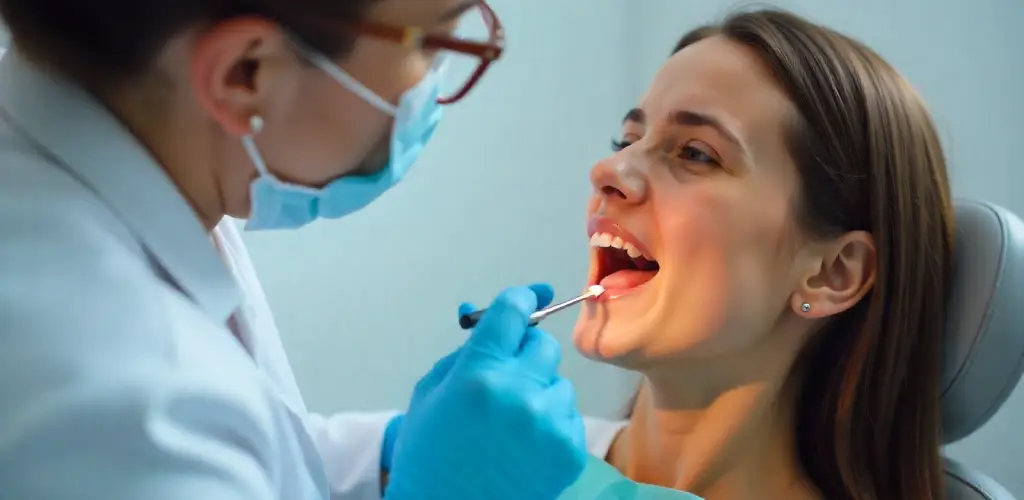
When these actions become difficult to do, you should consider seeking medical help. Persistent low saliva production can make you feel like you have cotton in your mouth. Remaining silent throughout this discomfort can be damaging and lead to worse situations.
Visiting a dental clinic for a checkup can help enable a quick diagnosis. As a result, the dentist can select the best course of action to resolve the issue. If it’s a permanent condition, they could prescribe a medication or a saliva substitute.
Conclusion
Many people suffer from temporary or long-term dry mouth and its symptoms. Very few of them attempt to treat it or find the underlying cause. This is where your dental visits make a difference.
Dentists like Dr. Alexander Heifitz, the founder of 65 Broadway Dental NYC, look beyond your teeth. Dedicated dentists look to fix issues related to your gums, tongue, and even salivary glands.
FAQs
1. Can dry mouth heal itself?
Simple steps can resolve the issue of low saliva production. The key is to understand the underlying cause. For temporary and immediate relief from dry mouth, sipping water or chewing ice chips can help.
2. How do I get my mouth to stop being so dry?
Identifying the root cause behind the dryness is essential to curing it. Drinking more water, using saliva substitutes, adjusting diet, and following better oral care.
3. What foods should you avoid if you have a dry mouth?
Foods to avoid if your mouth isn’t producing enough saliva are sugary foods, spicy foods, and salty foods. You’ll want to avoid beverages like alcohol, tea, and coffee, which naturally dry out the mouth.
4. What deficiency causes dry mouth?
Mouth dryness could be due to deficiencies in nutrients or minerals. Shortages of Zinc, Iron, Vitamin B, and Vitamin A can cause changes in saliva production.
5. What’s the common cause of dry mouth?
The most common cause of mouth dryness is medication. Besides this, dehydration, disease, and aging are the other common causes of dry mout
6. What is the best drink for dry mouth?
Dentists and doctors will confirm that water is still the best solution for mouth dryness. It’s a natural remedy that doesn’t affect the teeth and cause decay.

Dr. Alexander Heifitz (Author)
Dr. Alexander Heifitz is the founder of 65 Broadway Dental in NYC, where he combines advanced dental expertise with a patient-first approach. He specializes in cosmetic and restorative treatments such as dental implants, veneers, Invisalign, and smile makeovers, helping New Yorkers achieve both oral health and confidence.
Booking An Appointment
Looking for a reliable dentist in Downtown NYC? Whether you need a routine cleaning, urgent care, or a full smile transformation — we’ve got you covered. We accept most PPO insurance plans and offer flexible scheduling.
+1 (212) 430-3888
Call for appointment
Walk-ins Welcome / Same-Day Appointments Available

Related Blogs
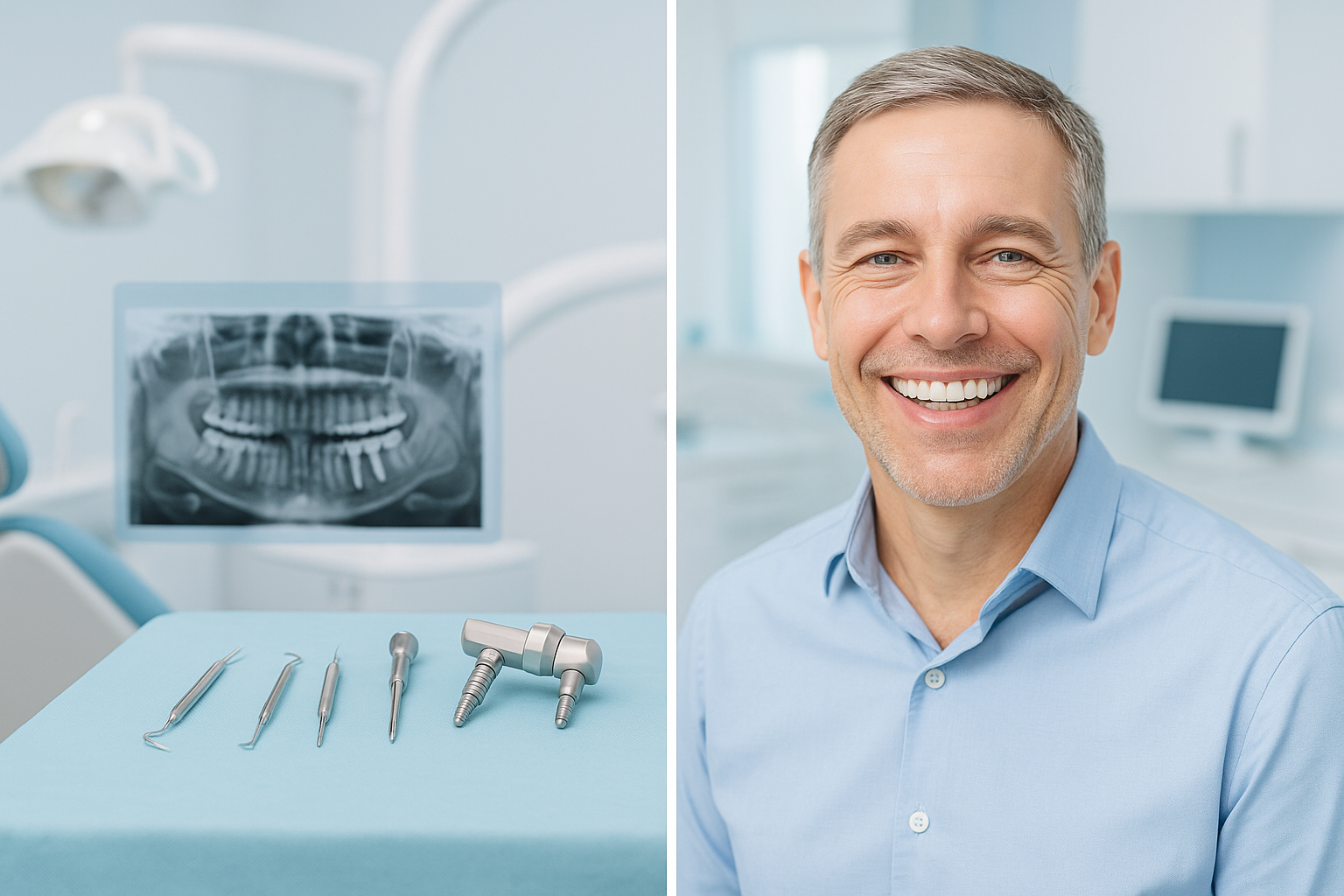
All-on-4 vs Traditional Implants: Trusted NYC Dentist Guide
All-on-4 vs traditional implants: Discover key differences, costs & benefits with insights from top NYC dentists to help you choose the right smile solution.
Read More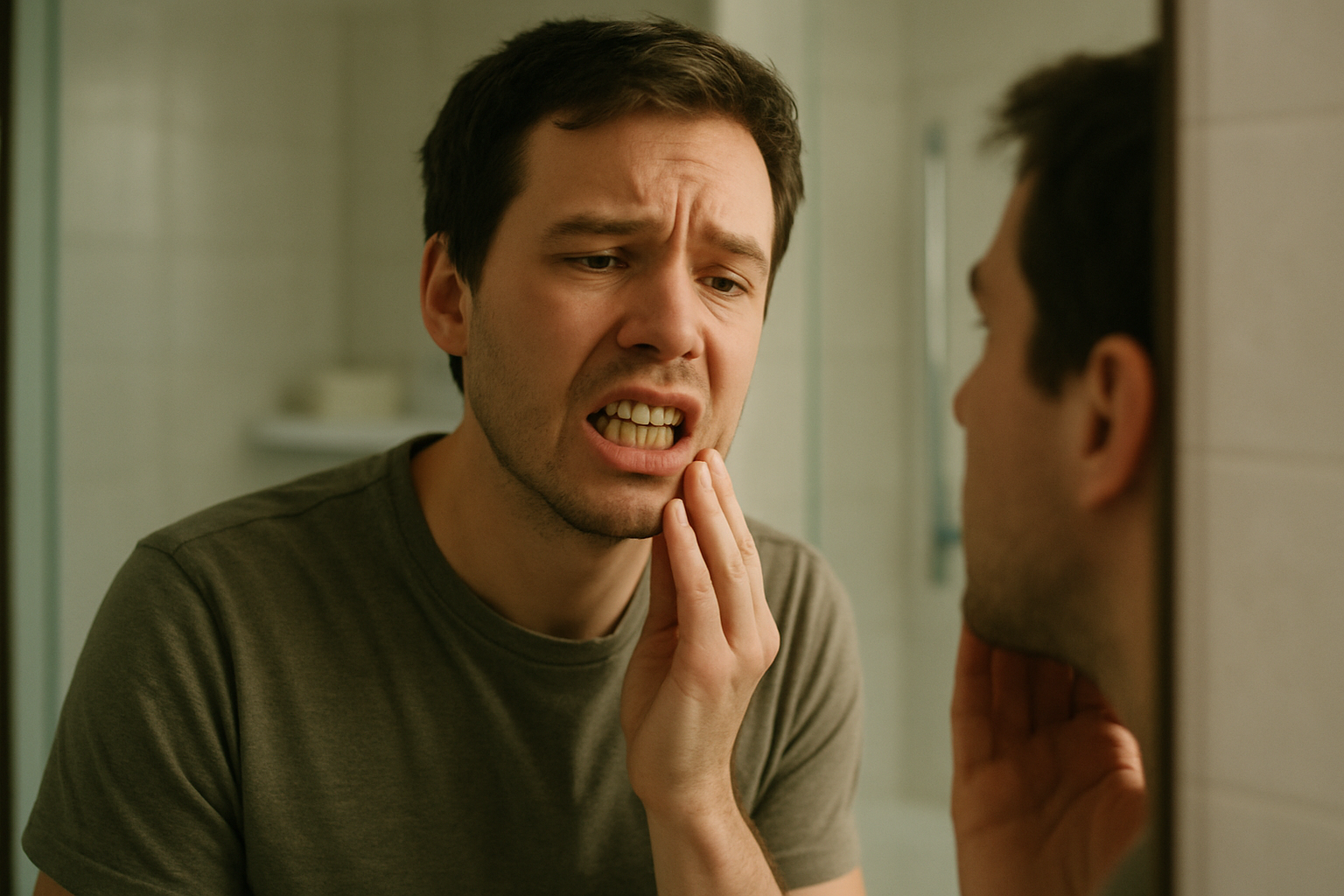
5 Signs You Need a Dental Checkup Before It’s Too Late
Spot these 5 signs early and avoid serious dental issues, book your NYC checkup before it’s too late.
Read More